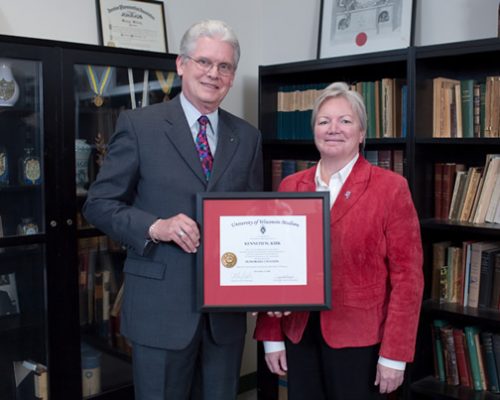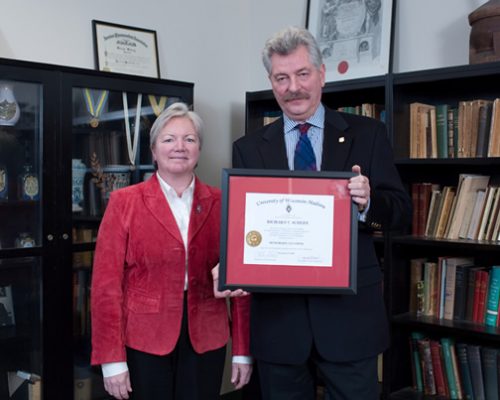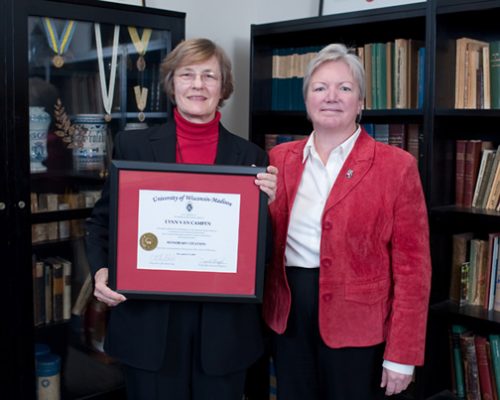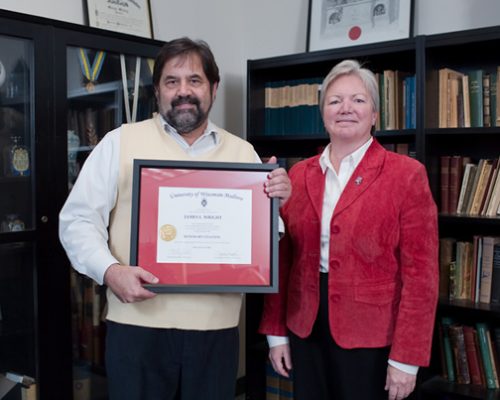Kenneth Kirk
Citation recipient Dr. Ken Kirk (left) with Dean Jeanette Roberts (right)
Dr. Kenneth “Ken” Kirk earned his Bachelor of Science in Pharmacy at Ferris State University and his MS and PhD in Pharmacy Administration from the University of Wisconsin. Dr. Kirk started his academic career after graduation at UW as Assistant Professor of Pharmacy Administration and Extension Services in Pharmacy. His career path led him to a variety of academic positions at Purdue University and the University of Texas at Austin.
Dr. Kirk joined the National Association of Chain Drug Stores in 1993, serving as Vice President of Academic Affairs and Secretary of the NACDS Education Foundation. In 1995, he returned to academia as the Vice President for Academic Affairs and Dean of the St. Louis College of Pharmacy and he served in this position until his retirement in 2006.
Over his long and distinguished career, Dr. Kirk made a significant impact with his contributions to the literature and numerous presentations in the general areas of social and administrative pharmacy. He has been the recipient of a number of awards for teaching excellence; his former graduate students have made significant contributions to academic pharmacy and pharmacy practice as well.
Richard Schiefe
Citation recipient Dr. Rick Schiefe (left) with Dean Jeanette Roberts (right)
Dr. Richard “Rick” Schiefe is a native Wisconsinite, born in Milwaukee and raised in Brookfield and Oconomowoc.
He started at the University of Wisconsin in architectural engineering. When it became abundantly clear to Rick that he had a complete absence of artistic ability, he decided that other avenues needed to be explored.
Rick had worked evenings for several years as manager of the camera department at Walgreen’s in Brookfield, where he had been inspired by the art and science of pharmacy and the professionalism of the pharmacists who had taken him under their wing. Coupled with his long-time fascination with chemistry, the lure of pharmacy as a profession crystallized.
Rick’s specific path in pharmacy was forever changed when, in 1971, David Angaran walked into Rick’s drug information class and announced that he would be offering an elective course in the fall called “Clinical Pharmacy.” It would involve rounding with physicians and seeing patients at the bedside. Dave also promised that it would be the toughest, most unforgiving course that the students would ever take. That was the “ah-ha” moment for Rick, starting his love affair with clinical pharmacy that continues to endure.
Rick then jumped across the pond to the University of Michigan to complete his PharmD and residency. One of the main reasons he chose the University of Michigan was that it was one of very few PharmD programs where, because of a quirky state law, the PharmD students got to dissect human cadavers in their anatomy course.
After completing his residency, Rick served on active duty with the U.S. Army Medical Services Corps as the first clinical pharmacist at Brooke Army Medical Center in San Antonio, Texas. He then moved to Boston after jumping at the opportunity offered by Bill Gouveia to implement the first clinical pharmacy service in Boston at Tufts-New England Medical Center. Rick maintained an active clinical practice in neurology and infectious disease for over 30 years. He still serves as a consultant in neuropharmacology to the Department of Neurology.
Rick has always deeply enjoyed teaching and holds Associate Clinical Professor appointments with the two schools of pharmacy in Boston, Tufts Medical School and Tufts Dental School.
In 1985, Rick was appointed Editor, then Editor-in-Chief of Pharmacotherapy by its founder, Russell Miller. After nearly 25 years, Rick still loves the endless challenges that the running of a journal provides.
Lynn Van Campen
Citation recipient Dr. Lynn Van Campen (left) with Dean Jeanette Roberts (right)
Dr. Lynn Van Campen had always liked math and science in high school and college. Given the opportunity to pursue independent research with her favorite professor of biochemistry at Mary Washington College, her choice became clear, and she took every chemistry course they offered. Not keen to end up working at an oil refinery in Houston, however, Lynn happily came upon the opportunity to join Pfizer one day in 1970, on the beach with her parents in New London, Connecticut. Three weeks later, she joined Pfizer as an analytical chemist. A few months later, the next opportunity arose to move into the new department of “physical pharmacy” there—said to be the first of its kind in industry, its name coined a few years earlier right here at the University of Wisconsin School of Pharmacy.
Over the following six years, a young cadre of “Pharmaceutics” PhD’s had gathered at Pfizer. Lynn found herself inspired yet frustrated by what they could think and do that she couldn’t for lack of knowledge in an area that had long intrigued her, and began to consider graduate school. Encouraged by her colleagues, the only question was “where.” The answer was loud and clear: the only place to study pharmaceutics was Wisconsin!
In August 1976 she moved to Madison and set foot on campus on a sunny Saturday afternoon for the first time. Her host and “guide” for the day was none other than then-Dean George Zografi who showed her around the School and introduced her to those working busily in the labs. Over the following five years, Lynn had the unusual opportunity to work with both Dean Zografi and Professor Jens Carstensen as co-advisors studying the phenomenon of deliquescence. After earning her Masters degree, largely based on her design and construction of a unique glass vacuum rack apparatus able to control accurately the exposure of test solids to water vapor, she launched into the experiments that would support her doctoral research. With the help of Professor Zografi as well as Professor Gordon Amidon, Lynn devised a quantitative relationship from first principles that described the kinetics of deliquescent behavior—the first of its kind. This work earned the 1984 Ebert Prize awarded by the American Pharmaceutical Association’s Academy of Pharmaceutical Sciences.
Completing her PhD in 1981, she rejoined industry back in Connecticut, this time with Boehringer Ingelheim Pharmaceuticals. Over the next 7 years, she was responsible for the development of solid and inhalation dosage forms, their related technology transfer to production, and led a joint U.S.-Germany protein development project team. Recruited to a small biotech firm in Colorado to start up a protein formulation group, she took their first product into clinical studies. After little more than a year there, she was enticed to return to Boehringer as Director of Pharmaceutics where she became responsible for all dosage form development, technology transfer, and clinical product manufacturing and packaging in the U.S.
In 1996 she was recruited to a young company named Inhale Therapeutic Systems, now known as Nektar Therapeutics, to become their first VP of Pharmaceutical Development. There she helped to grow the company nearly ten-fold at a time when the key corporate product development program was that of inhaled insulin, in time partnered with Pfizer. The dramatic failure of Exubera to develop a market after approval by both the FDA and in Europe is, according to Lynn, as close as she has ever gotten to the front page of the New York Times!
Once again the beneficiary of Professor Zografi’s attention, Lynn was delighted to return to the Madison campus in late 2003 to reinvigorate and lead the Zeeh Pharmaceutical Experiment Station here in the School of Pharmacy. Its mission was right up her alley: educating students and practitioners in the process and science of drug development, and providing related laboratory and consulting services to University labs, area start-up companies, and the pharmaceutical industry. Having hired excellent Zeeh Station leadership and staff for the long term, Dr. Van Campen retired from the school in 2007 and maintains private consulting and Advisory Board ties with the pharmaceutical industry.
Over the years, Lynn’s other contributions include serving the American Association of Pharmaceutical Scientists as Co-Chair of a strategic planning initiative that resulted in the realignment of Sections which for the first time enabled the Association to serve those members who work in the manufacturing sciences and engineering. She has written several book chapters, and presented numerous talks and lectures in various conferences and short courses. She currently serves on the Steering Committee of the Product Quality Research Institute.
James Wright
Citation recipient Dr. James Wright (left) with Dean Jeanette Roberts (right)
Dr. James “Jim” Wright earned his Master of Science degree in 1977 and a PhD degree in 1983 in Pharmaceutics from the UW School of Pharmacy. He currently is the Vice President of Pharmaceutical Development at Infinity Pharmaceuticals, where he is responsible for manufacturing, formulation, and analytical controls in support of the development of new chemical drug candidates. He has over 25 years of pharmaceutical drug development experience including positions as the Vice President of Pharmaceutical Sciences at Millenium Pharmaceuticals and as Senior Vice President of Development at Cambridge-based Alkernes where he led the development efforts for sustained release injectable and inhalation protein products. His career path also took him to Boehringer Ingelheim, and he served also briefly on the faculty of the UW School of Pharmacy during the 1980’s.
Dr. Wright remained active with the school and is currently an Adjunct Professor in our Extension Services in Pharmacy Division, serving as an instructor for the Pharmaceutical Solids Short Course and Water Short Course. In addition, he has served 3 years as a member of the Zeeh Pharmaceutical Experiment Station Advisory Board. He also serves as a member of the Board of Directors for Medicine in Need, a not-for-profit organization at Harvard, working on pulmonary and oral drug delivery methods designed to treat tuberculosis in the Third World.





